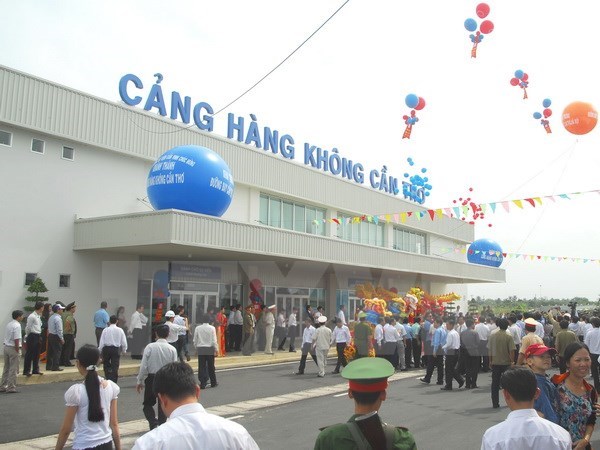
The Mekong Delta city of Can Tho will open more direct domestic and international routes, targeting promising markets in Southeast and Northeast Asia.
Can Tho Airport (Source: VNA)
The information was revealed by Le Tien Dung, Deputy Director of the Can Tho
Department of Transport, at a working session between the municipal People’s
Committee and the Civil Aviation Authority of Vietnam (CAAV) on July 12.
Accordingly, routes connecting Can Tho and the northern port city of Hai Phong,
Vinh city in central Nghe An province, Cam Ranh city in central Khanh Hoa city,
Hue city in central Thua Thien-Hue province and Da Lat city in the Central
Highlands province of Lam Dong will be launched in the coming time.
At the same time, Can Tho will consider opening routes to the Republic of
Korea, Japan and Singapore, aiming to attract more investments from these
countries in the city and the Mekong Delta as well.
Air routes from Can Tho to Taiwan and other foreign destinations are also
expected to be opened in the future.
According to Dung, there is a high demand for aviation transport from Can Tho
International Airport to other Vietnamese cities and provinces and foreign
countries as the city is the centre of the Mekong Delta.
The new air routes are expected to help ease the overload of Tan Son Nhat
International Airport in Ho Chi Minh City, while reducing travel cost and time,
he added.
Speaking at the working session, Vo Huy Cuong, CAAV deputy head, pointed to the
need to cut ticket prices of domestic flights from Can Tho, which , he said,
still remain high.
The CAA also pledged to create favourable conditions for Can Tho to launch the
new routes.
Le Thanh Phong, Chairman of the Mekong Delta Tourism Association, called for
joint efforts of the entire region to help Can Tho successfully conduct air
routes.
The municipal People’s Committee vowed to facilitate the operation of airlines
in Can Tho International Airport.
The Mekong Delta welcomed more than 28 million visitors in 2016 and over 20
million in the first half of this year. The number is expected to sharply
increase in the time ahead.-
Source: VNA
Since the beginning of this year, under the direction of the Department of Agriculture and Environment, the Sub-Department of Agricultural, Forestry, and Fishery Product Quality Management has strengthened the integration of the professional activities to promote and guide the organizations and individuals in the production and trading of agricultural, forestry, and fishery products to comply with the legal regulations regarding the use of chemicals, pesticides and veterinary medicines in crop cultivation, livestock farming and aquaculture. They also provide guidance to processing and manufacturing establishments on keeping the records to trace the product origins and using food additives from the approved list according to the regulations.
Hoa Binh province saw a significant rise in state budget revenue in the first two months of 2025, heard a meeting chaired by Vice Chairman of the provincial People’s Committee Quach Tat Liem.
Ha Thi Ha Chi, a 26-year-old graduate in law, has taken an unconventional path by returning to her hometown in Mai Chau district to establish the Tong Dau Cooperative, creating stable jobs for local women and bringing Thai ethnic brocade weaving to the global market.
As the Lunar New Year 2025 approached, pork prices surged, creating a profitable season for farmers in Tan Vinh commune, Luong Son district. Taking advantage of the rising demand, Can Minh Son, a farmer from Coi hamlet, sold over 30 pigs at 69,000 VND/kg, each weighing more than 100 kg. After deducting expenses, his family earned a profit of over 50 million VND.
alternate member of the Central Party Committee, Secretary of the Hoa Binh provincial Party Committee Nguyen Phi Long on March 5 had a working session with Yan Jiehe, Founder and Chairman of the China Pacific Construction Group, one of China's largest private corporations in the field of transport infrastructure. Deputy Secretary of the provincial Party Committee, Chairman of the provincial People's Committee Bui Duc Hinh and leaders of provincial departments and sectors also attended the working session.
The electronic printed circuit board (PCB) manufacturing and processing plant of Japan’s Meiko Group, located at Da River Left Bank Industrial Park in Hoa Binh city with a total investment of over 200 million USD, is expected to create thousands of jobs and make a significant contribution to the local budget.



